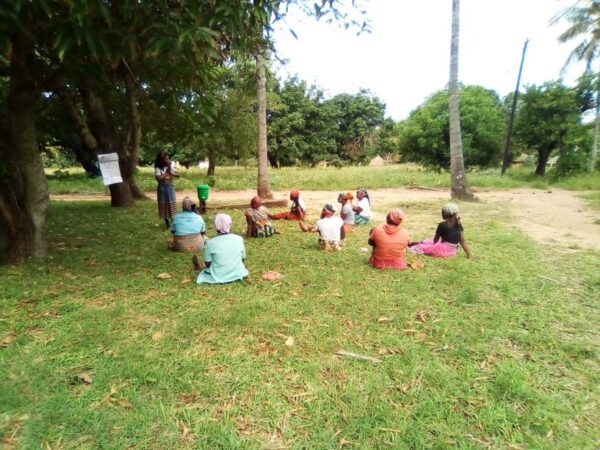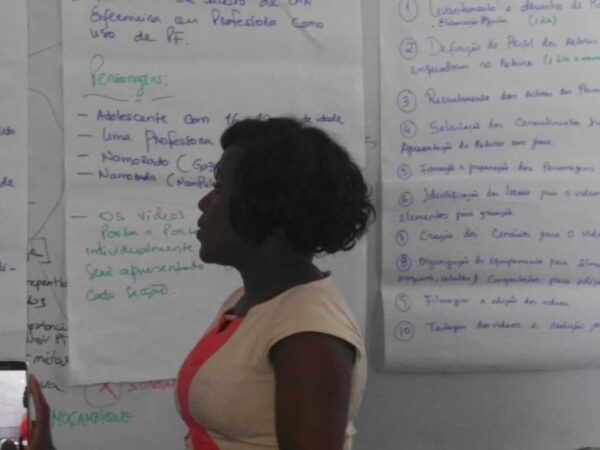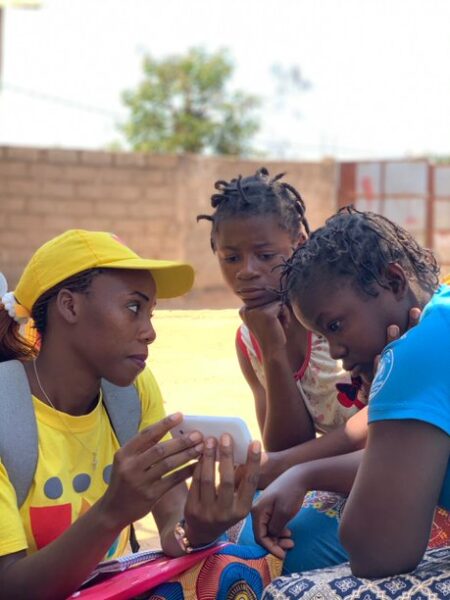By Shazia Jodá, Communications Assistant, PSI Mozambique
From its start in 2016, PSI’s flagship youth-powered sexual and reproductive health (SRH) project Adolescents 360 (A360) has committed to sharing its learnings as the project strives to change the conversation around contraception, with and for young people. Herein lies the heart of A360’s Open Source – a treasure chest of applicable resources to support us all in driving adolescent and youth SRH breakthroughs.
The toolkit covers four phases: Inquiry (getting to know the subject), Insight Synthesis (analyzing and understanding gathered information), Prototyping (creating and testing different design ideas), and Adaptive Implementation (adapting interventions in real-time as projects pursue impact at scale).
We – PSI Mozambique’s Vale-a-Pena (VAP), a youth-powered SRH project funded by UK Aid – turned to Open Source to develop intervention components aimed at engaging adolescent girls to make healthy and smart decisions about their futures, and promote discussion around the benefits of contraceptive use.
The result? Four tools adapted for purpose.

Tool #1: Videos Responding to Questions and Concerns about Contraception
We began our research with inquiries, led by the VAP team alongside a storyteller; we drafted and used questionnaires that sought to get as much information as possible from our subjects using an HCD approach.
Our insights were then gathered though the use of tools such as downloading learnings, journey maps, how might we and insight statements with the purpose of better sharing gathered information; identifying and strategizing for key moments; transforming problems into opportunities and getting information prototype ready. This was where the VAP team noticed the need for audiovisual tools to better resonate messages with girls and women – since our subject relies mostly on sound and images to understand whatever messages are being transmitted. Though immersive research we created fictional animated personas for each segment we wanted to target.
When we got to the Prototyping phase, we developed communication tools that would be based on the stories of our personas, creating audiovisuals, such as explanatory and motivational videos. We opted for tools that allowed us to brainstorm, bundle ideas, rapidly prototype and determine what will be used. The team created a video that addresses SRH in general and parents’ will, focusing on the issues girls have told them they face when their parents force them to marry too early. These include leaving school due to pregnancy, less access to economic opportunities, increased risk of domestic violence and the risk of early, frequent, and very high-risk pregnancies.
After running low, medium, and high-fidelity tests, VAP quickly understood two things that led to the first Adaptive Implementation phase:
- Girls reacted differently to the video depending on where they were from; some couldn’t understand the messaging around contraception because they didn’t relate to the context of early marriage – because getting married at a young age was something seen as normal by them – or because since they were already married, it was too late for them to avoid child marriage.
- Not every parent or husband would allow VAP promoters to show these videos to the girls or women in their homes, either because they didn’t understand who the promoters were, or they didn’t understand the importance of family planning—and sometimes both.
After discovering these insights, the VAP team took the original video out of circulation and went back to Prototyping and created two new videos in response to the issues that blocked girls, parents and husbands from understanding their messaging around contraception. Through these videos, the team tailored the information presented to serve each situation the promoter might encounter. These are videos that introduce the Promoter and Nurse in a standardized way as well as give a detailed explanation of what contraceptives and how they work:
- “The VAP Promoter:” a video that responded to questions and concerns about who the VAP promoters were, what they were doing and why they existed.
- “The VAP Nurse’s news:” a video showcasing a nurse, who responds to questions about contraception.

Tool #2: Behavior Change Videos
We had a second round of inquiries that led us to gather more insights – where were able to understand that most girls and women rely on parents, partners, and their community; they are influenced by and easily accept advice from other women/friends. So, the VAP team went back to Prototyping and created behavior change videos, tailoring the information included to serve the different archetypes the promoter could encounter and allowing girls to relate to the context of the video more easily. These videos are almost inspirational and aim to motivate the girl/woman to seek for SRH services:
- “Rosinhas´ decision:” a video that portrays friends advising each other on planning their future, targeted at adolescent girls that already have children.
- “Our best:” a video that portrays young girls deciding to prioritize their dreams and aspirations.
So how did VAP adapt not only the messaging it presented to girls, but also how it was presented? They involved the entire family unit—including husbands.

Tool #3: The Your Future Tool
In another round of Adaptive Implementation, the VAP team wanted to build on another successful program, A360 Ethiopia’s Smart Start. Initially, the team wanted to explore whether the Smart Start approach, which leads with financial planning, would be more relevant for rural, married couples than the VAP messages about pursuing goals and succeeding in school. As they tested the approach, a new opportunity became obvious—to speak with husbands directly. The team took note that husbands would not give the promoter permission to speak with their wives alone – which is often due to myths, taboos, misconceptions related to contraceptives or even not being certain that the promoter will safeguard their family’s health. VAP saw that they could use financial planning messages to assuage husbands’ fears and supported them to use the Your Future tool – which makes use of simple conversations around saving and resources to encourage men to discuss family planning and the benefits of using contraceptives with their wives. We began using the tool in January 2020.
Tool #4: Community Dialogues
We also made sure girls didn’t feel alone when their parents or guardians created a barrier to SRH information and services by inviting them to participate in community dialogues. At these sessions, we create safe spaces to create discussion and engagement around any misconceptions girls and their families might have around contraception until they feel comfortable and confident that these methods will not harm the girls’ health, but instead will help her to reach her dreams.
An adaptive learning workshop was conducted in October 2019 to help VAP promoters to transition from decision making—i.e., deciding which tools best fit each client – to problem solving so that they can easily adjust to challenges, notice, and take advantage of opportunities or respond to negative reactions from parents, husbands, and adolescents themselves.
In a nutshell, working with Open Source and its inclusive co-design engagement process enables teams to implement projects, services, or products more assuredly. The inclusive co-design process provides a firm foundation for the whole project to stand on, allowing them to immerse with the community/people they are working with, appropriately select their intervention methods and apply the tools.
This piece is a part of A360’s replication series on the UK Aid-funded Vale-a-Pena project. With and for young people, Vale-a-Pena is proving the power in applying A360’s youth-powered approach to determine what it takes to enact effective, resonant and ultimately lasting adolescent and youth sexual and reproductive health (AYSRH) behavior change in Mozambique – and beyond.






















